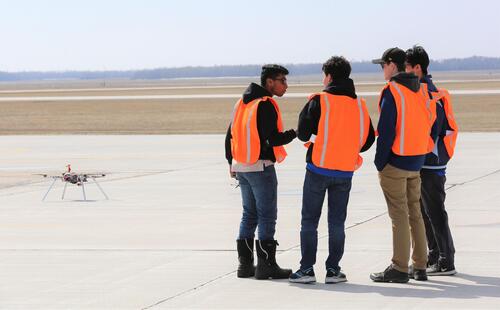
Members of student team WARG (Waterloo Aerial Robotics Team) confer while competing at an event in Manitoba.
This article was originally published on the Faculty of Engineering's news site.
Members of a University of Waterloo student team with a strong engineering contingent didn’t snag any hardware, but they still came home with valuable lessons from a recent competition for unmanned aerial vehicles.
The Waterloo Aerial Robotics Group (WARG) was one of seven university teams from across Canada to put their entries to the test at the 13th Unmanned Systems Canada Student UAS Competition in Southport, Manitoba in May.

“We came here to learn and to collect data, and we did just that,” said Sahil Kale, the team’s technical director and pilot. “I’m proud of us for getting in the air both days.”
Lessons learned ranged from the importance of having clear areas of responsibility to reduce confusing communication among team members, to having more spare parts on hand to handle inevitable repairs.
WARG, which draws more than three-quarters of its members from engineering programs, had the only unmanned vehicle system in the competition that was developed entirely in-house. Over half of members are in their first or second years of study.
“Whether we succeed or fail in competition, the goal is to ensure that students leave the team with technical skills and memorable experiences that they take with them after graduation,” said Jenny Luo, the team’s business lead.
Members on the contest team, dubbed Project Vanguard, were Sahil Kale, Jenny Luo, Ryan Dullaert, Aidan Bowers, Matt Visser, Brielle Chenier, Anthony Luo and Daniel Puratich.
The competition is meant to promote and develop Canadian expertise and experience in unmanned aerial systems technologies.